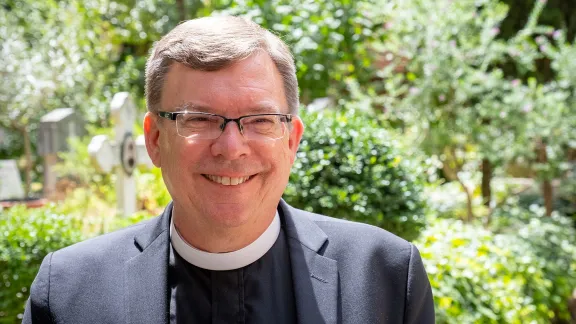
Prof. Dr Dirk Lange during the visit of an LWF delegation to the Vatican in June 2021. Photo: LWF/A. Danielsson
Ecumenical hopes and expectations for 2022
As we reach the conclusion of the Week of Prayer for Christian Unity, we are reminded in the meditations from the Middle East Council of Churches that we never really “conclude” that prayer! We pray unceasingly for unity, as Christ prayed that his disciples may be one. It is our fervent, constant, and all-encompassing prayer that we enter more fully into that mystery of communion that is the church.
The work for unity does not cease either. Even if COVID has slowed down activities, with many meetings postponed, the LWF and its ecumenical partners continue to find ways to move forward. We sincerely hope that 2022 will be a year when some face-to-face international dialogue meetings may again take place. The Lutheran-Orthodox Dialogue Commission has been postponed twice and we now look to a possible meeting in the latter half of 2022. The Lutheran-Pentecostal dialogue group has been busy completing its report and we hope for an in-person meeting to finalize it in the fall of 2022.
In the meantime, work also continues online. The Lutheran – Roman Catholic Study Group on the excommunication of Martin Luther has compiled several papers and anticipates meeting this spring to map out the next steps towards a Common Word to be presented at the LWF Thirteenth General Assembly in Kraków, Poland in 2023.
The Religious Freedom Study Group – compromised of theologians from the World Communion of Reformed Churches (WCRC) and the LWF – has begun work exploring the complexities of the right to religious freedom and belief. COVID permitting, a conference on the subject will be held in late November in Germany. This study group is living into the Wittenberg Witness, signed between the WCRC and the LWF in 2017, particularly committing ourselves to a renewed imagination of what being the church in communion could mean (point 5).
Reception and implementation
An internal Study Group has also taken up the work of the Trilateral Report (Baptism and Incorporation into the Body of Christ, the Church) which addressed a number of challenges to all three partners - Lutheran, Mennonite, and Roman Catholic. The challenges to Lutherans are the focus of this group as they study the link between baptism, catechesis and a life of service, as well as exploring the many dimensions of a renewed theology of the child.
The steering committee of the Anglican Lutheran International Commission on Unity and Mission (ALICUM) has been working online for the past two years. It is with great anticipation that we hope to meet in-person this year to launch the work of reception, bringing together local bishops for the implementation of the many agreements reached between the Anglican Communion and the LWF.
The work of reception and implementation of consensus statements remains crucial, as stated in the LWF Commitments on the Ecumenical Way to Ecclesial Communion. The many ecumenical documents developed over the years point us towards that unity which is God’s gift. But we are also called to step ever deeper into that gift, living that unity in ways that are already possible now. That call is both joy and challenge, requiring continual self-examination and inner conversion. As the Magi walked towards the manger guided by the star, so we walk together, supporting one another, searching together, keeping our eyes fixed on the author and perfector of our faith, Jesus Christ.


